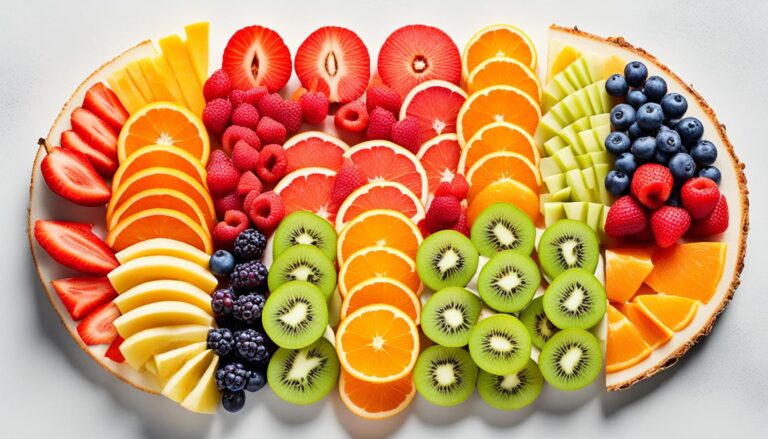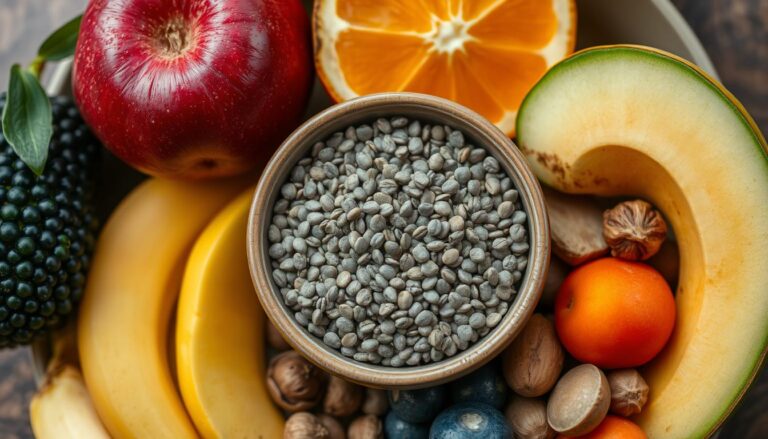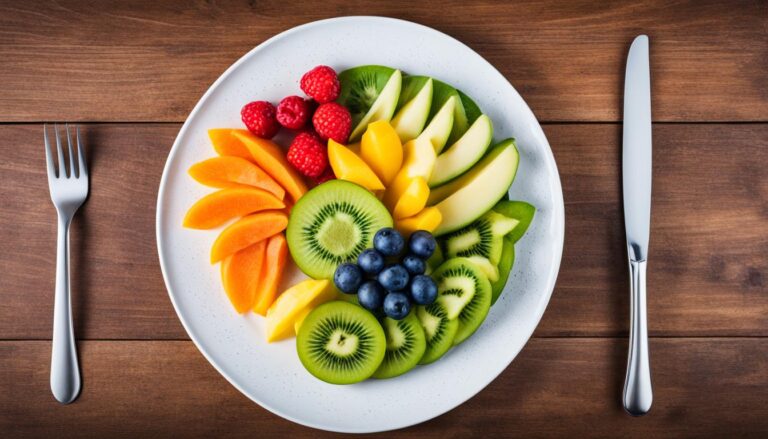Do you dread the first grey hairs? Premature greying can be upsetting and make you feel self conscious. But, some foods might help slow it down. We’ll look at the top foods to keep your hair color and fight ageing signs.
Key Takeaways
- Certain foods are rich in nutrients that can help prevent premature greying of hair.
- Antioxidant-rich fruits and vegetables support healthy hair follicles and melanin production.
- Protein, biotin, and B-vitamins are crucial for maintaining strong, vibrant hair.
- Omega-3 fatty acids promote scalp health and reduce inflammation that can lead to greying.
- Incorporating a balanced, nutrient-dense diet is key to slowing down the greying process.
Ready to find out the best foods to stop grey hair? Let’s explore the dietary secrets to keep your hair color natural.
Causes of Premature Greying
Genetics play a big role in when we start to go grey. Stress and oxidative stress can also make hair turn grey early. As we get older, the chance of grey or silver hair grows by 10-20% every decade after 30.
Genetics and Age
Our genes control how fast we lose melanin in our hair follicles. This leads to grey or white hair. Most people start seeing grey hair before 50. Some even go grey before 30.
Stress and Oxidative Stress
Chronic stress can affect hair color. It causes inflammation that stops melanin production and shortens hair growth. Oxidative stress also damages tissues and can make hair grey early.
Smoking and zinc deficiency can make hair grey sooner. Some medicines can also cause hair to lose color.
| Causes of Premature Greying | Explanation |
|---|---|
| Genetics and Age | Genetic factors determine the rate of melanin loss, leading to greying. Chances of going grey increase by 10-20% every decade after age 30. |
| Stress and Oxidative Stress | Chronic stress can lead to chronic inflammation, inhibiting melanin production and shortening the hair growth cycle, resulting in premature greying. Oxidative stress also contributes to premature hair greying. |
| Lifestyle Factors | Smoking and zinc deficiency have been linked to early onset of grey hair. Certain medications may also cause hair depigmentation. |
There are reports linking the occurrence of premature canities greying in the Indian population.
The Role of Melanin in Hair Color
Melanin is the natural pigment that gives hair its color from dark brown to light blonde. It is produced by cells called melanocytes in the hair follicles. As hair grows, melanocytes add melanin, giving it its color.
Eumelanin and Phaeomelanin
There are two main types of melanin: eumelanin and phaeomelanin. Eumelanin makes hair brown and black. Phaeomelanin gives hair red and blonde tones. The mix of these melanins decides our natural hair color.
Melanocytes and the Melanogenic Clock
As we get older, melanin production can slow down or stop. This leads to grey or white hair. Researchers think a melanogenic clock in melanocytes controls this.
This clock can slow down due to genetics, stress, and poor nutrition. A healthy lifestyle and a balanced diet can help keep melanin production up. This might slow down graying.

Melanin is the key to hair color, and understanding its role is crucial in preventing and managing premature graying.
Anti Inflammatory Foods for Healthy Hair
Eating foods rich in antioxidants can greatly help your hair stay vibrant and young. These foods fight off inflammation that can harm hair cells. This is key for keeping your hair looking its best.
Antioxidant Rich Fruits and Vegetables
Berries, dark leafy greens, red grapes, and fresh herbs and spices are full of antioxidants. Chia seeds, for example, are packed with copper and phosphorus. These nutrients help make melanin and strengthen hair.
Tempeh, a fermented soy product, also supports healthy skin and shiny hair. It has copper, zinc, and phosphorus. Quinoa is another great choice, with high-quality protein that feeds hair follicles.
Its tyrosine helps with hair and skin color. Spinach, carrots, beets, and amla Indian gooseberry are also rich in vitamins and minerals. They’re great for scalp health and keeping hair pigmented.
Limiting Pro-Inflammatory Foods
It’s also key to cut down on foods that cause inflammation. Avoid soda, candy, processed meats, and fried foods. They can lead to oxidative stress and harm hair health.
Choosing whole foods rich in antioxidants can help your hair stay healthy and strong. It’s a simple way to support your hair’s vitality and longevity.
| Anti-Inflammatory Foods | Key Benefits for Hair |
|---|---|
| Chia Seeds | Rich in copper and phosphorus, promoting melanin production and strengthening hair strands |
| Tempeh | Contains copper, zinc, and phosphorus to support healthy skin and shiny hair |
| Quinoa | High in protein to nourish hair follicles, and tyrosine to aid in hair and skin pigmentation |
| Spinach, Carrots, Beets, Amla | Packed with vitamins and minerals essential for scalp health and hair pigmentation |
Vitamins and Minerals for Hair Health
Healthy hair isn’t just about what you put on it. The right vitamins and minerals can also help. Some nutrients can even affect hair color and how it grows. Premature greying can be caused by genetics and age, but not just those things.
Vitamin D, B12, and Other Key Nutrients
Vitamins D and B12 are key for hair health. Studies show that up to 50% of people may start to grey by age 50. Vitamin D and B12deficiencies might play a part in this.
Other important vitamins for hair health include vitamin E, A, zinc, iron, copper, selenium, and magnesium. You can get these from foods like fish, eggs, leafy greens, nuts, and whole grains. But, too much of these minerals and vitamins can cause hair loss.
| Nutrient | Role in Hair Health | Best Food Sources |
|---|---|---|
| Vitamin D | Supports melanin production and pigmentation | Fatty fish, egg yolks, fortified milk and cereals |
| Vitamin B12 | Crucial for red blood cell formation and hair growth | Meat, poultry, eggs, dairy, fortified cereals |
| Zinc | Aids in protein synthesis and cell division for hair | Oysters, red meat, poultry, beans, nuts, seeds |
| Iron | Supports oxygen circulation and melanin production | Red meat, lentils, spinach, cashews, quinoa |
While vitamin and mineral deficiencies can lead to early greying, most people get enough from a balanced diet. Blood tests can spot any missing nutrients.
There is no conclusive proof that ‘anti-gray’ supplements work in preventing gray hair growth, as trials have not been conducted.
What foods stop grey hair?
Stopping grey hair early is simple. Just add certain foods to your diet. Focus on biotin and protein to help keep your hair color.
Foods Rich in Biotin and Protein
Biotin, or vitamin B7, is key for hair growth and color. It’s found in:
- Nuts and seeds, such as almonds, walnuts, and sunflower seeds
- Eggs
- Mushrooms
Protein is vital for strong hair. Eat foods high in protein to keep your hair looking good. Great options are:
- Lean meats, like chicken and turkey
- Fish, such as salmon and tuna
- Dairy products, including Greek yogurt and cheese
- Legumes, including lentils and beans
Eating a mix of biotin-rich and protein-rich foods can stop grey hair. It also keeps your hair color longer.
Omega-3 Fatty Acids and Scalp Health
Want to stop grey hair from coming too soon? Eating more omega-3 fatty acids might help. These fats, found in fish like salmon, mackerel, and sardines, are key for a healthy scalp. A healthy scalp is vital for keeping hair color.
Omega-3s fight inflammation, which can dry out and irritate the scalp. This is important because inflammation can harm the cells that make melanin, the pigment in hair. So, omega-3s might help slow down grey hair.
Studies show that omega-3 and omega-6 fatty acids, with antioxidants, can help with hair loss and make hair thicker. Omega-3s also boost hair growth in animal and human studies.
To get the most from omega-3s, eat 2-3 servings of oily fish a week. If fish isn’t your thing, try flaxseed oil, walnuts, or chia seeds. But, be aware of side effects like bad breath or heartburn. If diet alone is hard, consider an omega-3 supplement.
Omega-3 fatty acids are essential for maintaining a healthy scalp, which in turn supports the production of melanin and prevents premature greying.
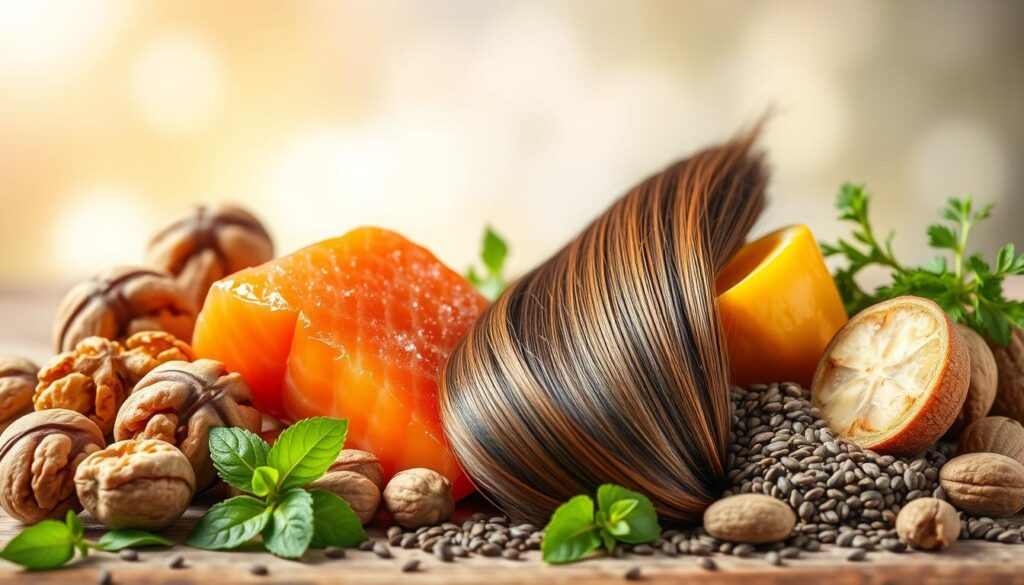
Whole Grains and B Vitamins
Eating whole grains like brown rice, quinoa, and oats can help fight early hair greying. These foods are packed with B-vitamins. B-vitamins are key for making melanin, the pigment that gives hair its color.
B-vitamins, like biotin vitamin B7 and vitamin B12, are vital for hair health. They help hair follicles grow and function well. With enough B-vitamins your hair can stay healthy and vibrant.
Supporting Melanin Production
Whole grains also offer other nutrients for melanin making. Iron, zinc, and copper are important for melanin production. Eating whole grains ensures you get these minerals, helping your body make pigment.
Studies show that fixing nutrient gaps, like in copper and vitamin B12, can slow hair greying. So, add more whole grains to your diet. This will nourish your hair and keep it looking young and vibrant.
Maintaining a nutrient-rich diet high in Copper, B vitamins, Iron, and antioxidants can help prevent premature greying of hair.
Antioxidant Rich Foods
Incorporating antioxidant-rich foods into your diet can fight premature hair greying. Antioxidants neutralize free radicals, reducing cell damage. This damage can lead to hair losing its color. Dark chocolate is a surprising superfood that’s full of antioxidants.
Dark Chocolate and Hair Pigmentation
Dark chocolate is tasty and full of antioxidants and minerals like copper. Copper is key for melanin production and hair color. Eating a little dark chocolate can help keep your hair color and prevent early greying.
Other foods rich in antioxidants for healthy hair include:
- Berries, such as blueberries and raspberries, which are packed with vitamin C and other beneficial compounds
- Leafy greens, like spinach and kale, which are rich in vitamins A, C, and E
- Citrus fruits, such as oranges and grapefruit, which provide a burst of vitamin C
- Colorful vegetables, like bell peppers and tomatoes, which contain carotenoids and other antioxidants
Eating these foods can help fight oxidative stress. This stress is linked to early hair greying. It can help keep your hair color for longer.

Eating a diet rich in antioxidants can help reduce oxidative stress, which is linked to premature greying of hair.
External Hair Care Habits
Diet is key for vibrant hair, but external factors matter too. Taking care of your hair outside, like avoiding heat and chemicals, helps keep it healthy. This prevents heat damage and greying and chemical damage and greying.
Avoiding Heat and Chemical Damage
Hot tools like blow dryers and straighteners dry out hair, causing it to gray early. Try to use them less and air-dry your hair instead. Chemical treatments, like hair coloring, also harm hair, making it more prone to external hair care habits that lead to graying.
- Limit the use of hot styling tools to prevent heat damage and preserve hair color
- Avoid frequent hair coloring and chemical treatments that can lead to chemical damage and greying
- Protect hair from environmental pollutants and UV radiation, which can also accelerate external hair care habits that cause graying
Choosing gentler hair care and avoiding harsh external factors helps keep your hair color vibrant. This way, you can slow down premature graying.
The key to healthy, vibrant hair is a balance of proper internal nourishment and mindful external care.
Medical Conditions and Premature Greying
Some medical conditions can make hair turn grey early. Autoimmune disorders like vitiligo and alopecia areata can cause this. Thyroid issues, such as hypothyroidism and hyperthyroidism, also speed up the greying process.
Genetics are a big factor in when hair starts to grey. Research shows people are more likely to grey early if their parents did. Not getting enough vitamins B12, folic acid, copper, and iron can also lead to early greying.
It’s key to see your doctor regularly. Tell them if you notice any changes in your hair or skin. They can find out if a medical issue is causing your grey hair and help treat it.
- Autoimmune disorders like vitiligo and alopecia areata can lead to premature graying.
- Thyroid-related conditions, such as hypothyroidism and hyperthyroidism, can also accelerate the greying process.
- Genetics play a significant role in determining the age of onset for grey hair, with some individuals being more predisposed to early graying.
- Nutrient deficiencies, including lack of vitamins B12, folic acid, copper, and iron, have been linked to premature graying.
Embracing your grey hair can be a liberating and empowering experience. It’s a sign of wisdom and confidence, not just aging.
Knowing the medical reasons for early greying helps people take action. They can work on any health issues and keep their hair looking healthy and vibrant.
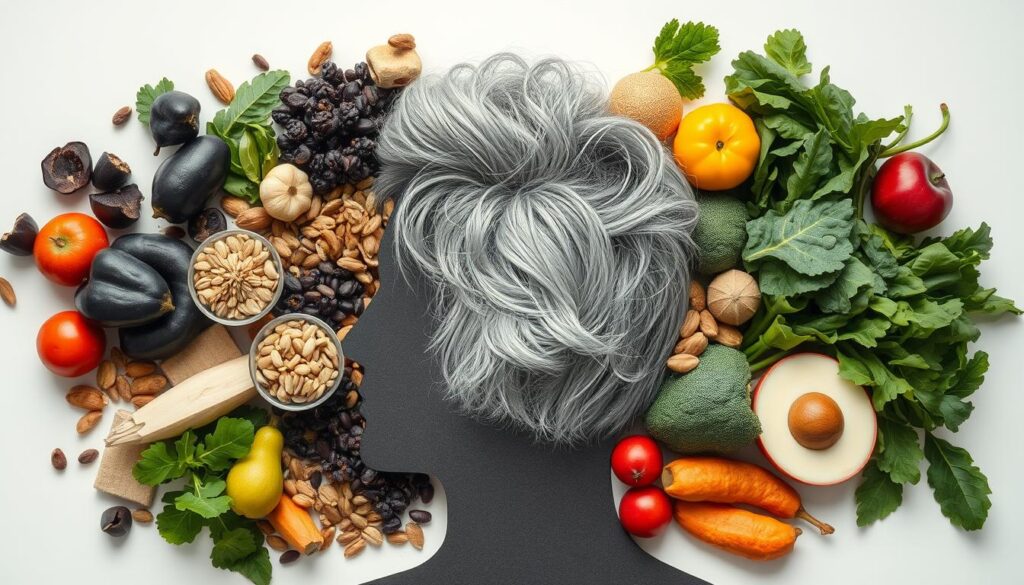
Conclusion
There’s no guaranteed way to stop or reverse grey hair. But, you can slow it down by eating right and living healthy. Eating foods that boost melanin and taking good care of your hair can help keep your natural color longer.
Genetics, stress, and oxidative stress can lead to early greying. Eating foods rich in vitamins and antioxidants helps melanin production. Also, avoid heat damage, limit chemical treatments, and protect your hair from the sun.
While you can’t promise to prevent grey hair, a holistic approach can help. Nourishing your hair from the inside and taking care of it can lead to positive results. By choosing the right foods and hair care, you can keep your hair looking vibrant and youthful.


